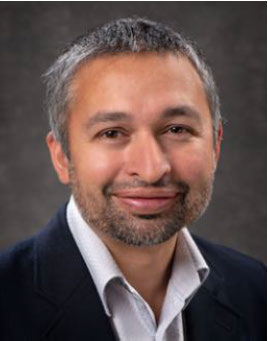When: 25 November, 15:00 GMT
Hydrogen will be a key energy carrier as we transition at scale to renewable sources of energy. Additionally, hydrogen is also a vital industrial chemical critical for food processing, fertiliser manufacturing, metal refining and oil upgrading. Electrochemical water splitting is the most mature and promising technology for green hydrogen generation to curtail intermittency of renewables on the energy grid. However, the need to use platinum group metals at high loadings as the catalysts and in other components of proton exchange membrane electrolysers (PEM-ELs) renders the technology expensive. In our research group, we are investigating strategies including: 1) engineering catalysts that drastically improve mass activities and durability of precious metal catalysts 2) replace precious metals in catalyst layers and other components with economic and sustainable alternatives. In this presentation, we will discuss recent efforts to design supported iridium catalysts for water electrolysis. We will specifically focus on titanium dioxide supported iridium catalysts currently under investigation. These UK Catalysis Hub funded investigations are to understand properties of the catalysts, especially in operating electrochemical environments. The ultimate goal is to improve intrinsic activities and conductivities to facilitate fabrication of highly efficient and durable electrolysers and unitised regenerative fuel cells.
Biography:

Yagya Regmi is an inorganic chemist interested in renewable energy storage and conversion. Within the field, his work spans developing advanced materials, catalysis, device fabrication, electrochemical testing, and techno-economic analysis. At the Manchester Fuel Cell Innovation Centre, his focus is on electrochemical generation of hydrogen and implementing fuel cells as power sources to decarbonise the energy and chemical manufacturing sectors.
Born in rural Western Nepal, Yagya completed chemistry undergraduate degree at Lyon College in Arkansas, United States. During his subsequent PhD at the University of Wyoming, Yagya developed advanced catalysts for fuel cells and electrolysers. A complete change in field took him to Knoxville, Tennessee to investigate thermochemical conversion of biomass to value added platform chemicals at the Center for Renewable Carbon. He then ventured west to California at Lawrence Berkeley National Lab to study unitised regenerative fuel cells. These devices work as both fuel cells and electrolysers, and if optimised properly, have the potential to revolutionise the energy landscape. Starting Dec 2019, Yagya joined the Manchester Fuel Cell Innovation Centre and the Chemistry Department at Manchester Metropolitan University where his research is focused on developing cost effective fuel cell and electrolyser components and devices.
Yagya N Regmi, Manchester Fuel Cell Innovation Centre, Manchester Metropolitan University.
Email: y.regmi@mmu.ac.uk
Watch a recording of the webinar below:




